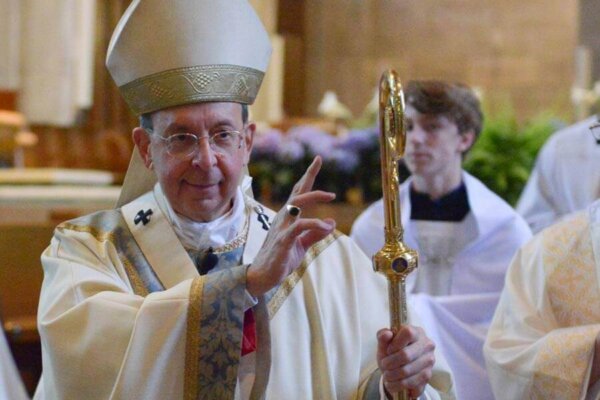Divine Mercy Sunday (2nd Sunday of Easter)
Holy Rosary Parish, Baltimore
April 7, 2024
Believing in Mercy
One week ago, on Easter Sunday, we renewed the promises of our Baptism. We rejected sin. We rejected the attractiveness of sin. We rejected Satan, the father of lies, who entices us to sin.
But we did not stop there. We also renewed our profession of faith: our faith in the God who created us and all that exists; our faith in God the Father who sent his Son into the world to redeem us; our faith Jesus Christ, God’s Son, who died, rose from the dead and is now exalted at the right hand of the Father; our faith in the Holy Spirit, the Sanctifier . . . and yes, our faith in the Holy Catholic Church that extends the saving mission of Christ to every corner of the world until the Lord himself returns in glory.
But, dear friends, if we had to sum up in one word what it is we believe in, what would that word be? That word would be “mercy”. We believe in God’s mercy, in divine mercy.
What Is Divine Mercy?
Let us try to understand, as best we can, what God’s mercy is. It is not merely a judicial decree, nor is it akin to presidential pardon. Nor is it like a “Get Out of Jail Free” card, as if we were playing Monopoly. God loves us far too deeply and respects are dignity far too much than merely to apply “Windex” to our soiled souls.
Indeed, the Father loves us so much that he sent us his only begotten Son, who, in the power of the Holy Spirit, took flesh and was born of the Virgin Mary. He preached the Good News. He healed the sick. Forgave sins. Raised the dead. At length he was crucified for our sins. As we look upon Christ crucified, we glimpse the enormity and severity of sin, but we also glimpse the depth and goodness of divine mercy. Jesus, though sinless, took upon himself our sins. He is indeed “the Lamb of God who takes away the sins of the world.”
As with the Apostles in the Upper Room, we behold the Risen Lord, we realize to our amazement that he really has conquered sin and death, that he has restored our humanity, that he has bestowed on the Apostles and their successors the power to forgive sins in his Name and in his Person. What a grace and joy to be touched in our depths and healed of our sins by the Risen Lord in the Sacrament of Reconciliation. There we invited to find redemption and joy in Jesus’ open side, that is, in his open heart, the very abyss of God’s mercy.
Overcoming Skepticism
This mystery we believe in. Yet, not unlike the Apostle Thomas, we can be skeptical. We can think our sins are too great to merit God’s forgiveness. We can imagine that God tires of forgiving us, especially if we struggle with the same old sins. Or, it could happen that the merciless, angry culture we live in has rubbed off on us. We can absorb the “zeitgeist”, the spirit of the age, almost without realizing it.
Yet, it cannot be that way with us. The Lord loves us too much and too deeply for us to doubt the power of his mercy. At this Eucharist, and at every Eucharist, the Risen Lord stands in our midst just as surely as he stood in the Upper Room after his Resurrection. Let us not doubt his presence, power, and mercy, but like the Apostle Thomas let us exclaim, “My Lord and my God!”
Believing and Bearing Witness
Even so, it is not enough just to believe in Divine Mercy; nor is it enough simply to receive God’s mercy. If we are believers in God’s mercy and its recipients, then we must also be witnesses to God’s mercy, individually and collectively, as members of the Church, the Body of Christ. How do we bear witness to God’s mercy?
First by our willingness to forgive those who wrong us and offend us. Not for nothing did the Lord Jesus link the forgiveness of our sins to our readiness to forgive those who sin against us. Jesus included this in the Our Father and preached a parable on our duty to forgive others from our heart. In an unforgiving world, we bear witness to Divine Mercy by our readiness to forgive and forget, even when it is difficult to do so.
But our witness to Divine Mercy extends beyond our readiness to forgive. It also includes our readiness to engage in the works of mercy. St. Augustine taught that “mercy is heartfelt sympathy for another’s distress, impelling us to succor him if we can.” This means being ready to help a neighbor in need, and to do so with tenderness and generosity. Realizing how lavishly God loves us and how he has had mercy on us, we in turn are to share that love with a neighbor in need without expecting repayment or acclaim. This witness of unselfish love bears witness to God’s mercy which is, after all, a gift we have neither deserved nor earned.
And if anyone asks us the reason for our hope, let us be ready to answer – gently, respectfully, and courageously.
Through the prayers of Pope St. John Paul II and St. Faustina Kowalska, may our lives proclaim to one and all the message, “Jesus, I trust in Thee!”


